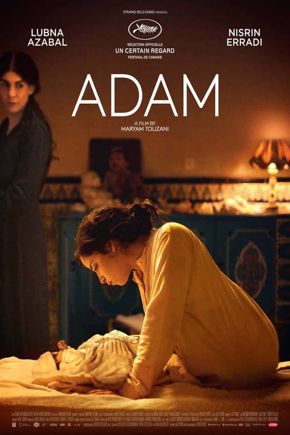Virtual Cinema | A Tale of Two Women, Two Mothers: “Adam” March 14, 2021
Marginalized groups are no strangers to director Maryam Touzani. The screenwriter/filmmaker highlights the lives of those rendered invisible in Morocco by social conventions and the legal system. Adam, her first feature film, is no exception. After previously tackling themes such as prostitution and the exploitation of children, in Adam Touzani turns her attention to single mothers. The shifts from silences, to music and laughter, to tears set the rhythm of this captivating and touching ode to motherhood.
Solidarity through Womanhood and Motherhood
Adam immediately plunges into the harsh reality of the struggles of pregnant Samia, who despite her state of exhaustion, continues walking the streets of Casablanca searching for employment and shelter. After seeing her greeted by doors slamming in her face, viewers understand that the cruel refusals to help stem from social judgments and the fear to welcome a woman who got pregnant out of wedlock.
Samia finally finds shelter in the home of a local baker: Abla, a widow who lives with daughter Warda. After a tense first encounter, the two women begin a beautiful friendship, founded on solidarity through womanhood and motherhood. Within the walls of the bakery, they build a safe space where they can exchange not only baking secrets but stories about their pasts, their inner struggles, and their hopes.
Children’s Innocence
Throughout the movie, Warda’s smiles bring a ray of sunshine to the household. She is also the first person to treat Samia with humanity, and Warda challenges Abla’s initial decision to reject the pregnant woman. Through Warda, Touzani delivers an important message: The innocence of children can teach valuable lessons about compassion. Although it is no coincidence that Adam—the name Samia chooses for her newborn son—serves as the film title, it is a surprising choice because the film focuses on Abla and Samia. However, Touzani ultimately sheds light on the devastating implications of the legal and social status of illegitimate children in Morocco.
• Adam / WATCH HERE Your ticket ($12) supports the MFAH and provides a 24-hour pass to the film. SEE THE TRAILER
About the Author
Siham Bouamer, an assistant professor of French and Francophone studies at Sam Houston State University, specializes in French and North African literature and film.
Underwriting for the Film Department is provided by Tenaris and the Vaughn Foundation. Generous funding is provided by Nina and Michael Zilkha; The Consulate General of the Republic of Korea; Franci Neely; Carrin Patman and Jim Derrick; Lois Chiles Foundation; ILEX Foundation; L’Alliance Française de Houston; and The Foundation for Independent Media Arts.






